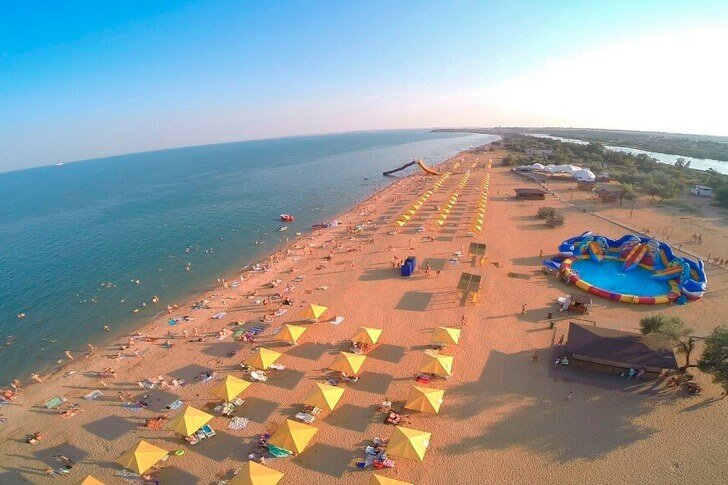Kerch is a unique city. It stands in the very place where the waters of the two seas meet - not without reason, even before our era, these lands were literally occupied by settlers from Hellas, who built several colonies here. It is a pity that only ruins remained from the ancient Panticapaeum, Myrmekia and Nymphaeum, but these ancient stones remember dozens of bygone centuries.
Kerch has an incredible number of sights from different periods: the tombs of the Bosporan kings, an exceptional and miraculously preserved temple of the 8th century, a Turkic fortress and architectural monuments of the period of the Russian Empire. Local sandy beaches are an excellent alternative to the rocky bays of the Southern coast of Crimea. Some of the bathing areas even seem to be more comfortable and adapted for a comfortable stay.
What to see and where to go in Kerch?
The most interesting and beautiful places for walking. Photos and a short description.
- Kerch ferry crossing
- Mount Mithridates
- Great Mithridatic stairs
- Yenikale fortress
- Kerch fortress
- Church of St. John the Baptist
- Panticapaeum
- Crypt of Demeter
- Adzhimushkay quarries
- Royal barrow
- Melek-Chesme barrow
- Historical and Archaeological Museum
- Lapidarium
- Kerch Art Gallery
- Museum of the history of the Eltigen landing
- The ancient city of Mirmekiy
- The ancient settlement of Tiritaka
- Ancient settlement of Nymphaeum
- Bulganak mud volcanoes
- Ostrich farm Exotic
- Chokrak Lake
- Cape Zyuk
- Cape Lantern
- General's beaches
- Kerch city beach
Kerch ferry crossing
Since 2014, a ferry crossing has been perhaps the only way to get from mainland Russia to Crimea. The transport hub functions clearly and smoothly, although in the high season you can wait in line for several hours. During a short 20-minute journey from one coast to another, you can admire the waves, flocks of gulls hovering near the ship waiting for food, and even, if you're lucky, see a flock of bottlenose dolphins.
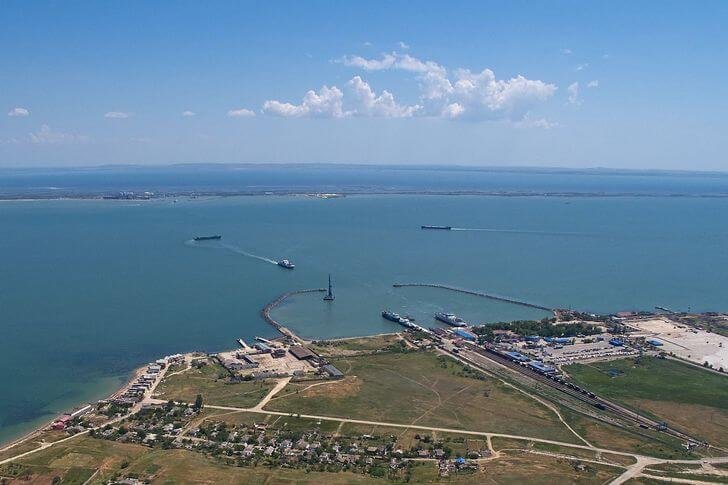
Mount Mithridates
A low 90-meter hill in the city, the geographical center of Kerch, on which the city of Panticapaeum was located in ancient times. The place is named after the Pontic king. Within the territory of the mountain there are several architectural monuments of different times. At the top there is a memorial of Glory to the Immortal Heroes, erected in honor of the soldiers who fell during the liberation of Crimea in 1943-44.
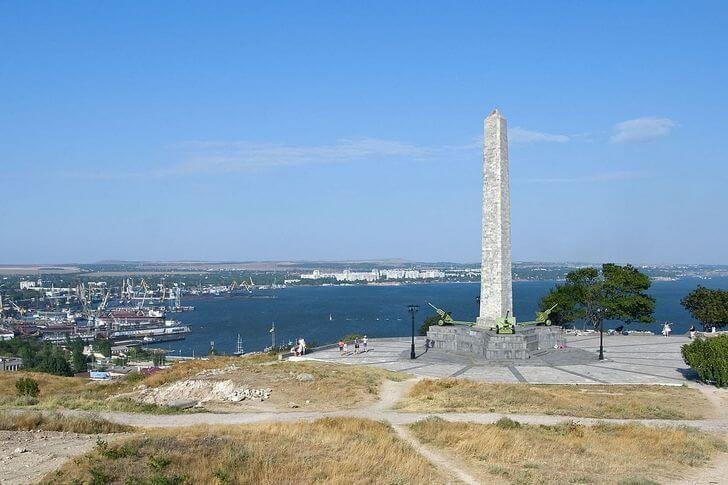
Great Mithridatic stairs
Initially, the staircase was built in the 19th century according to the design of the Italian architect A. Digby. It existed until the Crimean War, but as a result of the fighting it was damaged and destroyed. Restoration took up only after 130 years. The Kerch sculptor R. V. Serdyuk copied the ancient statues of griffins found at the excavations and decorated the flights of stairs with them. After the collapse of part of the structure in 2015, the next restoration work started.
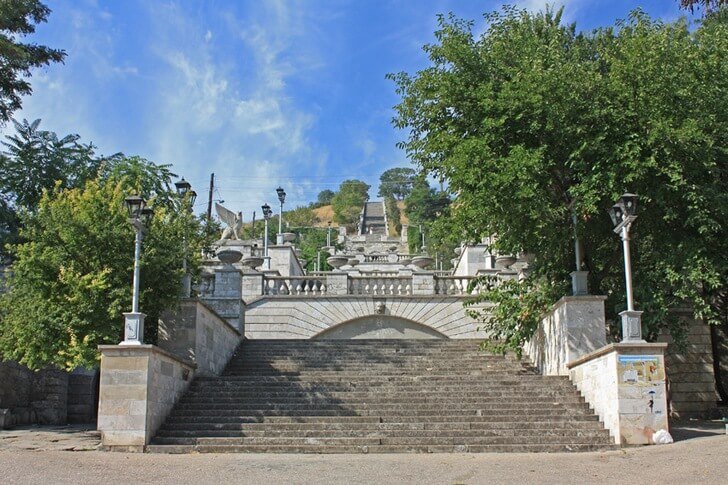
Yenikale fortress
An 18th-century Ottoman stronghold built by an Italian-born architect who was in the service of the Turks. This bastion was of strategic importance, as it prevented the passage of enemy ships through the narrow strait between the Black and Azov Seas. In 1771 Russian troops entered the fortress. By the end of the 19th century, it lost its military significance and was abandoned. At the moment, the attraction continues to collapse.
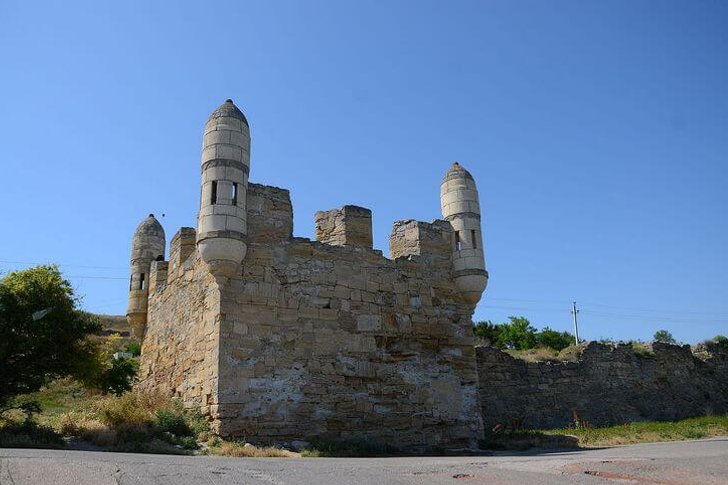
Kerch fortress
The fortification is located in the narrowest part of the Kerch Strait at Cape Ak-Burun. The complex was erected in the middle of the 19th century to defend the borders of the Russian Empire. In Soviet times, the armories of the Black Sea Fleet were located here. In 2003, after the disbandment of the military units, the fortress was transferred to the disposal of the local museum-reserve. Today it functions as a tourist site.
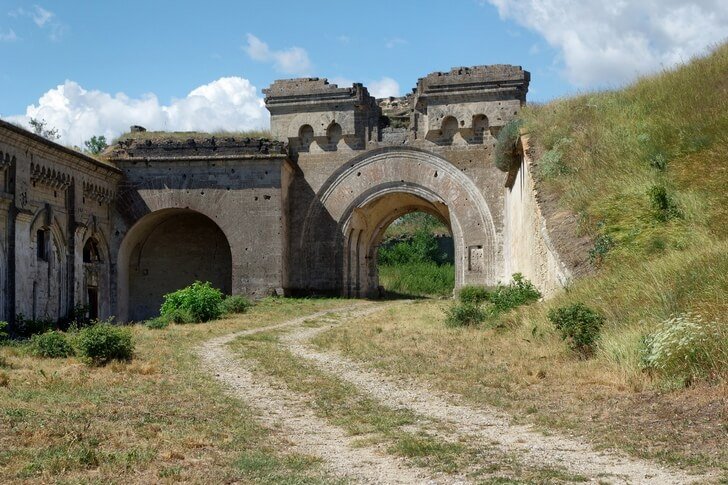
Church of St. John the Baptist
An early medieval Orthodox church of the 8th century (its oldest part was built in the 6th century), a unique monument of Byzantine architecture and the oldest religious building in the Crimea. The building acquired its final appearance in the 10th century during the existence of the Tmutarakan principality. The church is active, inside there is a modern iconostasis and utensils.
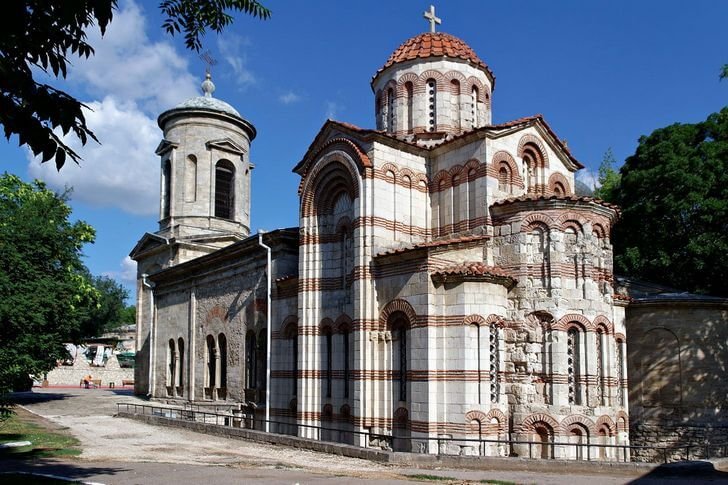
Panticapaeum
An ancient Greek colony that existed on the site of Kerch from the 7th century BC. In those distant times, magnificent temples stood here, and the streets and wide squares were full of people. Later, Panticapaeum was part of the Bosporus kingdom, was under the Scythian and Roman protectorate. The rich city was destroyed by the Goths in the 4th century, time has completed the work - today only ruins have survived from its former splendor.
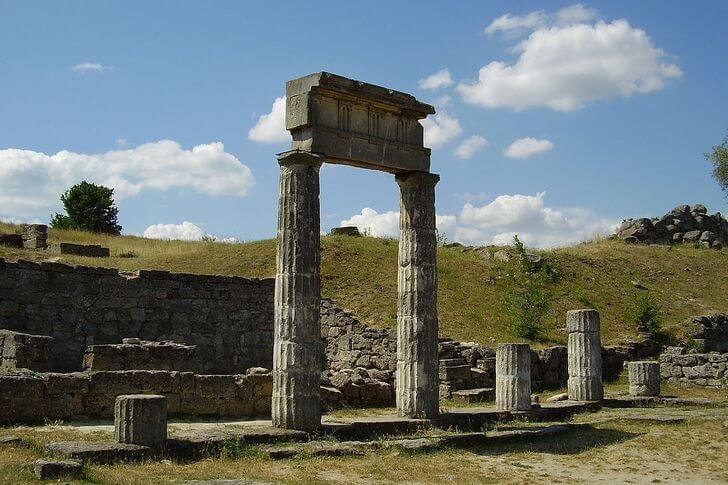
Crypt of Demeter
Ancient tomb with preserved remains of original frescoes. Currently, it is located in the middle of urban development, in ancient times it was located on the territory of Panticapaeum. The crypt is a rectangular building with walls made of stone blocks. A small corridor leads to the burial chamber. Given the considerable age of the wall painting, it is quite well preserved.
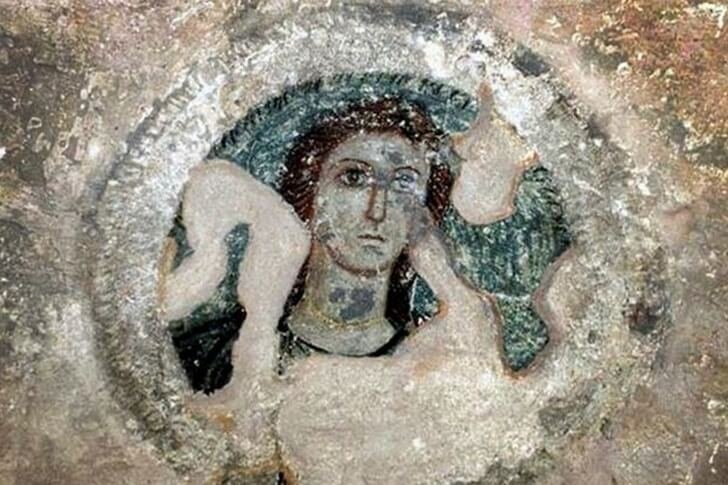
Adzhimushkay quarries
A complex of artificial caves, which were formed as a result of centuries-old extraction of shell rock. The place is famous for the fact that in 1942 the troops of the Crimean Front held the defense here. In 1966, the Adzhimushkay Quarry Defense Museum was organized on the territory of underground mines, and in 1982 a memorial was erected here in honor of the fallen soldiers. The entrance to the territory is located among stone slabs with figures of defenders carved on them.
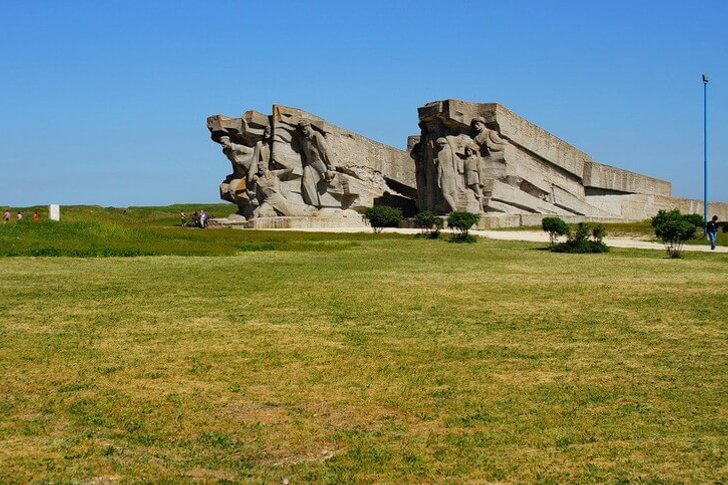
Royal barrow
Monument of the 4th century BC, which is the tomb of one of the rulers of the Bosporan kingdom. The burial mound rises 17 meters above the surface, under it there is a 36-meter corridor and a burial chamber, lined with smooth blocks. The hill itself consists of three layers: stone, clay, a mixture of pebbles and earth. When the archaeologists reached the mound, it had already been looted.
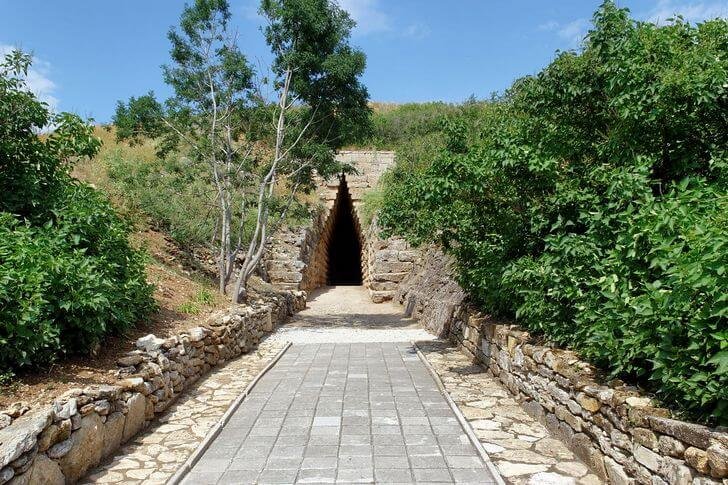
Melek-Chesme barrow
Another tomb of the 4th century BC, excavated in the middle of the 19th century. During the work, archaeologists hoped that the barrow remained intact and retained all its treasures, but they were wrong - it turned out to be as empty as the Tsar's. Local residents adapted to take out clay from here for household needs, but thanks to the money allocated from the state treasury, the attraction was saved. The first museum opened here in 1871.
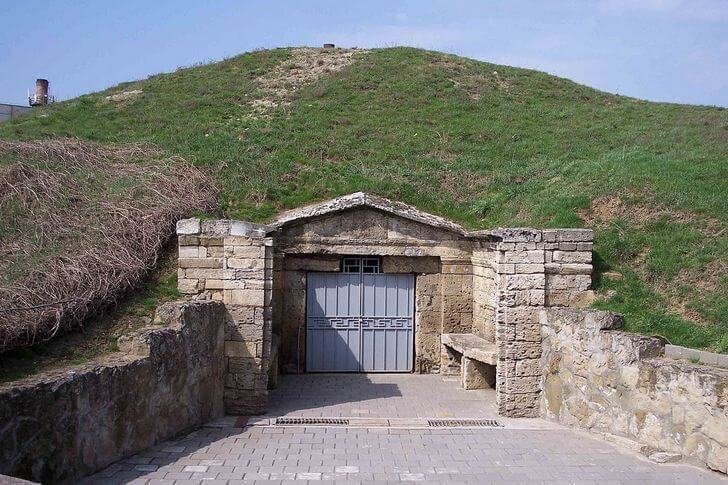
Historical and Archaeological Museum
The museum was founded in 1926, which makes it one of the oldest in Crimea. During the Crimean War, the building was destroyed, and the exposition was looted, some especially valuable items were taken to England, so now the exhibits of that time can be seen in the British Museum. Later, the collection began to be collected again, and the museum was given a new building. To date, more than 240 thousand copies are stored in its funds.
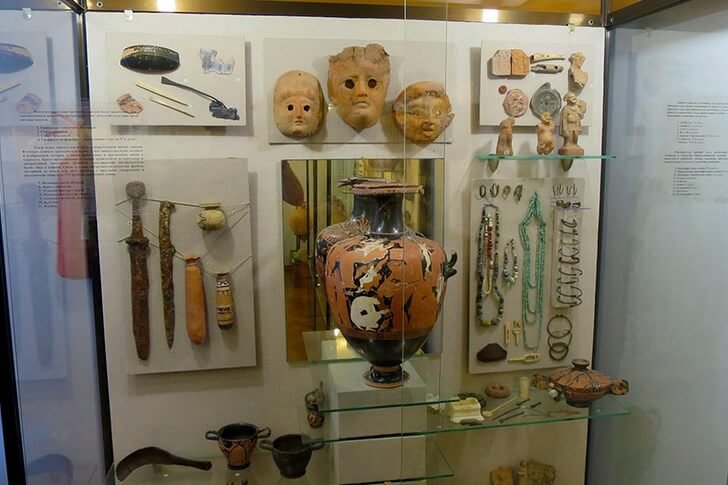
lapidarium
The lapidarium is a collection of ancient art objects found in excavations of settlements from the era of the Bosporan kingdom. Sculptures, tombstones, elements of facade structures containing inscriptions and bas-reliefs, religious objects and much more are exhibited here. The exposition is so diverse that it is appreciated all over the world. In total, there are about 6 thousand items in the lapidary.
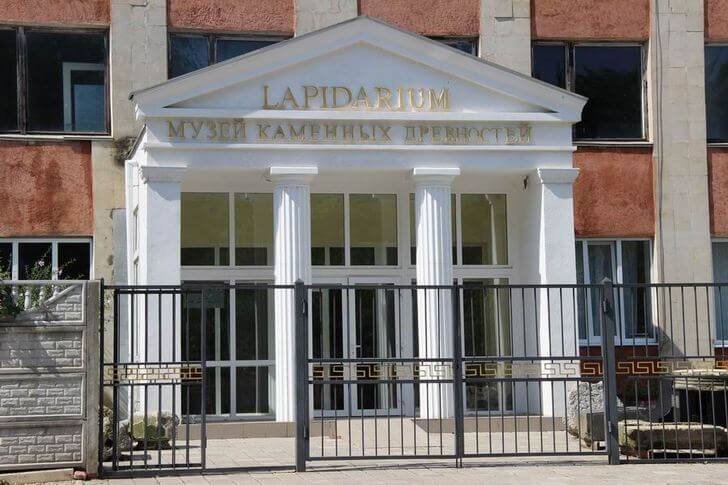
Kerch Art Gallery
The building of the art gallery is located near the Great Mithridates Stairs and is part of its architectural ensemble. The building was built in a classical style. The basis of the collection is the canvases of the founder of the museum - the artist N. Ya. But, and specifically - the cycle “Adzhimushkay. 1942". In addition to paintings, the gallery exhibits other exhibits: sculpture, ceramics, glassware and other art objects.

Museum of the history of the Eltigen landing
In 1943, near the village of Eltigen, Soviet paratroopers fought the German army for 40 days, showing remarkable courage. With these events, the liberation of Crimea from the invaders began. A museum was built at the landing site, which exhibits the belongings of fighters, weapons and awards, as well as a memorial complex, which includes a mass grave, a monument, the remains of trenches and a boat on a pedestal.
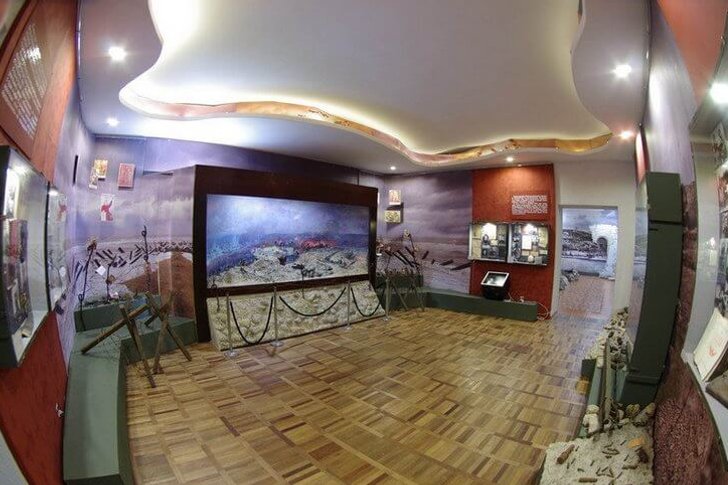
The ancient city of Mirmekiy
Mirmekiy is a colony of Ionian Greeks, founded on the shores of the Kerch Strait in the 6th century BC. It existed until the 10th century, in the Middle Ages new settlements began to appear in its place, due to which the ancient cultural layer sank underground. The first finds on the territory of Mirmekia were made in the 1830s, but regular excavations began in the 20th century. Today there is an archaeological complex here.
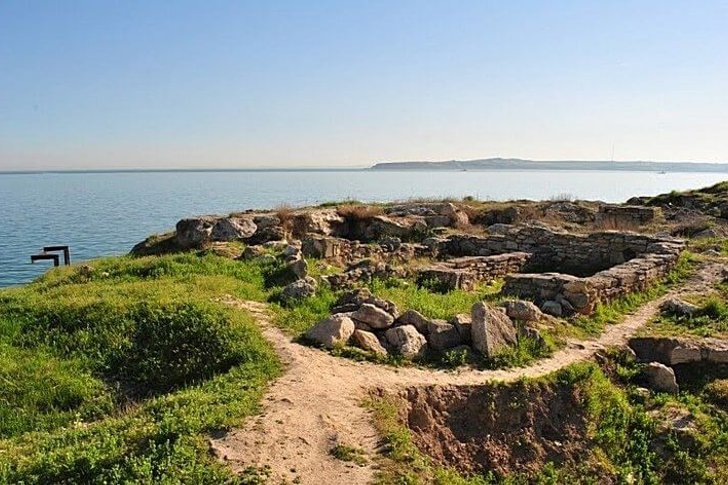
The ancient settlement of Tiritaka
Another settlement of the ancient era, which has survived to this day in ruins. It is located on a high plateau in the city. The settlement existed until the 8th century, after which it was destroyed during the Turkic raids. Continuous excavations have been carried out at the site since the 1920s. As a result, the foundations of houses, the remains of stone-paved squares and streets, were raised to the surface.
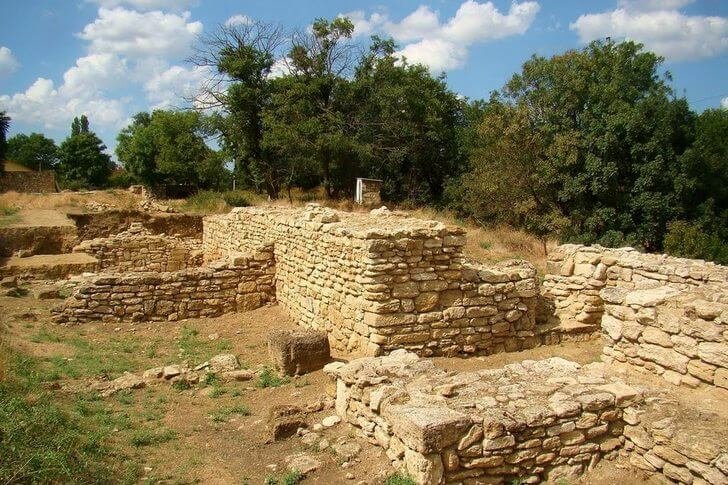
Ancient settlement of Nymphaeum
The ruins of an ancient Greek city, located about 17 km from Kerch. Given the number of ancient colonies in the city itself and its environs, one might think that settling in Taurica was even more prestigious than in Greece itself. It is a pity that none of the cities of that era, located in the Crimea, has survived to this day. Nymphaeum is the same ruins as Mirmekiy, Tiritaka and Panticapaeum.
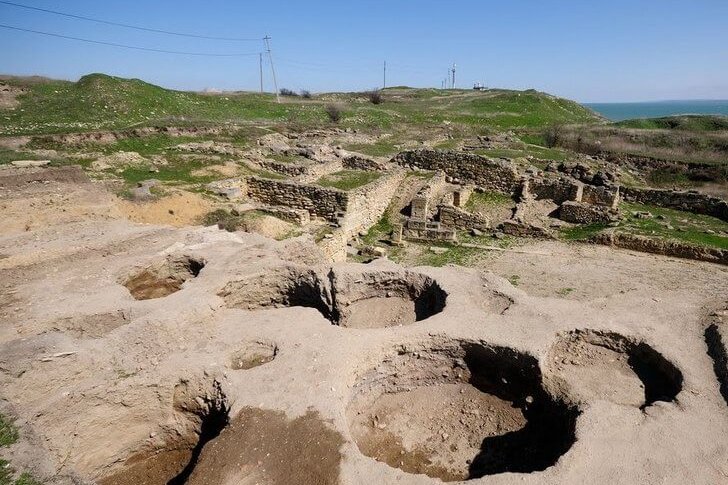
Bulganak mud volcanoes
Approximately 8 km from Kerch, on the territory of a shallow basin, there is a unique natural attraction - mud volcanoes. These are small lakes made of a mixture of brown-gray earth and water, having a thick consistency. Each puddle has craters, from which bubbles of gas escape from time to time. Sometimes the volcano throws out a rather powerful mud fountain with a jet height of up to 20 meters.
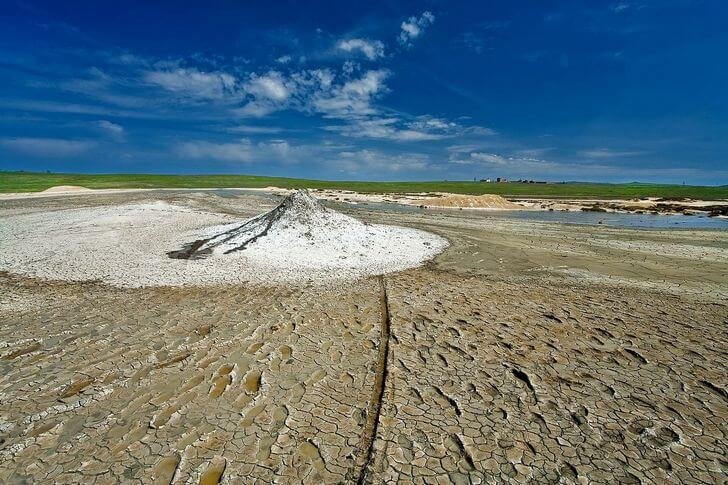
Ostrich farm "Exotic"
Almost every seaside resort considers it necessary to have its own ostrich farm. Kerch did not lag behind either - a couple of kilometers from the crossing in the village of Podmayachny, since 2004, these exotic birds have also been bred. The birds quickly acclimatized and almost immediately began to produce numerous offspring. Later they were joined by peacocks, pheasants, llamas, donkeys, ponies and other animals.
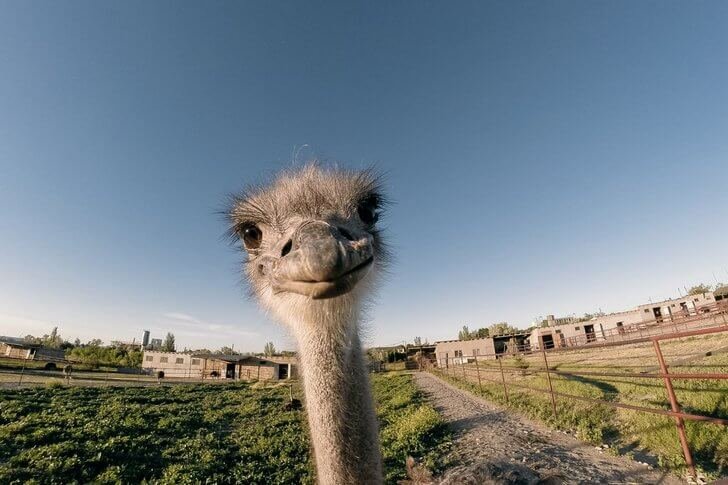
Chokrak Lake
Salt lake, located near the village of Kurortnoye, 16 km from Kerch. Until 1917, there was a mud bath near it, until the 1940s, salt was mined here. The reservoir is separated from the sea by a small strip of land, along which lies a strip of sandy beaches. Under certain lighting, the surface of the lake acquires a pinkish tint, which looks very picturesque against the background of the surrounding steppe.
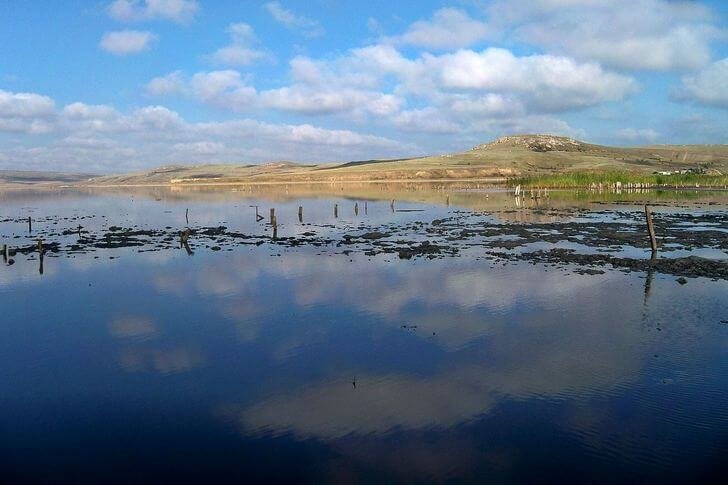
Cape Zyuk
The cape is the northern tip of the Kerch Peninsula. Even before our era, these regions were inhabited - a Greek settlement was located here (in Kerch and its environs, it is apparently easier to find a place where there were no ancient colonies). The cape protrudes into the Sea of Azov and is a natural boundary between two bays: the Reefs and the Marine Corps. The place is quite picturesque and deserted, perfect for contemplating the sea.
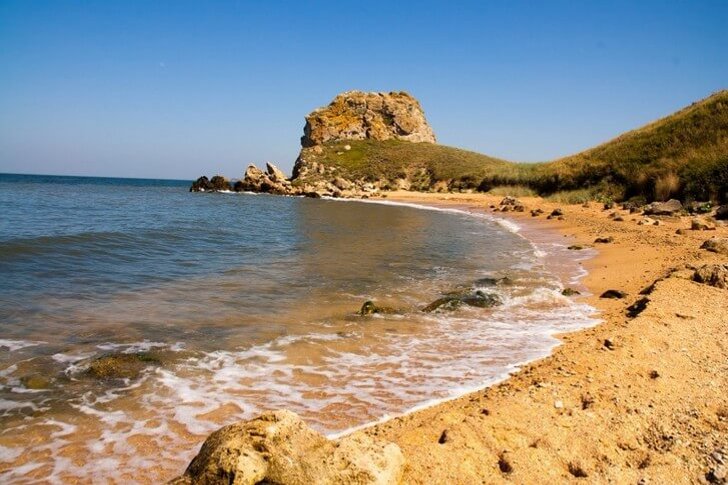
Cape Lantern
The cape is located on the eastern outskirts of Kerch at the entrance to the strait. A very convenient position for the lighthouse, which was installed here for the first time in 1820. The Lantern District is home to seagulls, cormorants and water snakes. The Yenikal lighthouse, restored after the Second World War in the 1950s, is still operational today. Although the tower looks slightly outdated, it is equipped with modern equipment.
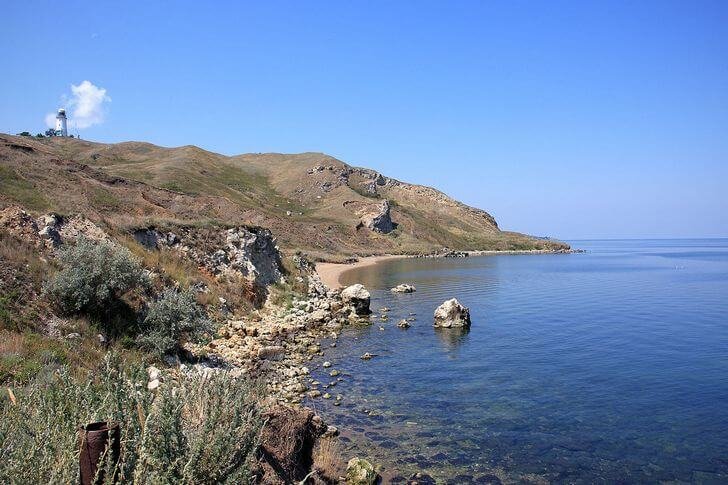
General's beaches
Picturesque bays surrounded by rocks, stretching along the coast of the Sea of Azov. They still retained their original beauty, so tourists come here looking for solitude and tired of the popular resorts. Behind a wide sandy strip, endless landscapes of the “Pontic” steppe stretch, the coastline is indented with dozens of small bays, there is not even a hint of civilization around - what else is needed for happiness?
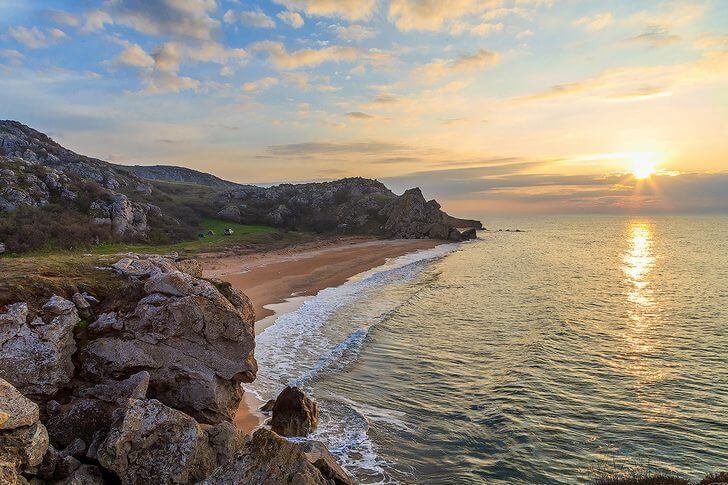
Kerch city beach
The main beach of Kerch is the most comfortable place for swimming in the city. It is located on the Kamysh-Burun Spit and has access to the embankment. Main advantages: flat bottom, sand and small shell rock, locker rooms, gazebos, cafes, sun loungers for rent and car parking. Vacationers are offered a lot of water rides and other entertainment.
